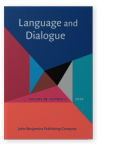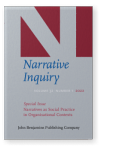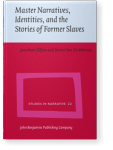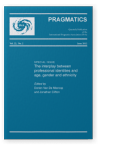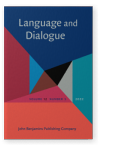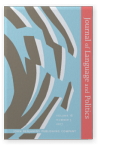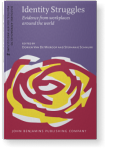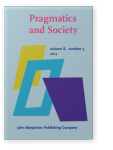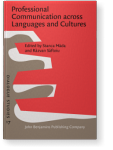Jonathan Clifton
List of John Benjamins publications for which Jonathan Clifton plays a role.
Journal
Titles
Narratives as Social Practice in Organisational Contexts
Edited by Dorien Van De Mieroop, Jonathan Clifton and Stephanie Schnurr
Special issue of Narrative Inquiry 32:1 (2022) vi, 243 pp.
Subjects Cognition and language | Discourse studies | Narrative Studies
Master Narratives, Identities, and the Stories of Former Slaves
Jonathan Clifton and Dorien Van De Mieroop
[Studies in Narrative, 22] 2016. viii, 229 pp.
Subjects Anthropological Linguistics | Communication Studies | Discourse studies | Narrative Studies | Pragmatics | Sociolinguistics and Dialectology
The interplay between professional identities and age, gender and ethnicity
Edited by Dorien Van De Mieroop and Jonathan Clifton
Special issue of Pragmatics 22:2 (2012) ca. 125 pp.
Subjects Discourse studies | Pragmatics
2022 Review of Crystal (2020): Let’s talk. How English Conversation Works Language and Dialogue 12:3, pp. 474–476 | Review
2022 Governmentality-in-action: The pursuit of happiness and identity-work in graduate career coaching interaction Language and Dialogue 12:3, pp. 335–359 | Article
Foucault’s notion of governmentality has been the focus of much research. However, little work provides an account of how governmentality is enacted as social practice. Using transcripts of naturally-occurring talk taken from a face-to-face coaching session and text taken from a career… read more
2022 Narratives as social practice in organisational contexts: Introduction Narratives as Social Practice in Organisational Contexts, Van De Mieroop, Dorien, Jonathan Clifton and Stephanie Schnurr (eds.), pp. 1–8 | Introduction
2018 The multimodal enactment of deontic and epistemic authority in Indian meetings Pragmatics 28:3, pp. 333–360 | Article
Authority is a much discussed topic in organizational literature, but its in situ enactment is little investigated. Using the notions of deontic and epistemic authority and using multimodal conversation analysis as a research methodology, the purpose of this paper is to provide an empirical… read more
2017 Justifying the jihad: The identity work of an Islamic terrorist Journal of Language and Politics 16:3, pp. 453–470 | Article
Islamic terrorism is arguably the biggest threat that western democracies are now facing. Using Membership Categorisation Analysis as a research methodology and transcripts of the recordings of the negotiations between law enforcement agencies and Mohammed Merah, a self-professed Islamic… read more
2017 Chapter 12. Identities on a learning curve: Female migrant narratives and the construction of identities of (non)participation in Communities of Practice Identity Struggles: Evidence from workplaces around the world, Van De Mieroop, Dorien and Stephanie Schnurr (eds.), pp. 225–240 | Chapter
Recent large scale immigration to Europe means that it is now faced with questions of identity that present immense challenges and opportunities which carry with them huge social, political and economic stakes. Using narrative analysis as a methodology and Lave and Wenger’s notion… read more
2017 “Are men sexually harassed?”: Enacting the discourse of hegemonic masculinity in the evaluation of stories of male sexual harassment on Kenyan talk radio Pragmatics and Society 8:3, pp. 448–471 | Article
Since MacKinnon’s (1979) ground-breaking work in which she coined the term sexual harassment, there has been very little consensus as to what it actually is. Using callers’ stories of male sexual harassment taken from Kenyan talk radio, the purpose of this paper is to analyse the in situ… read more
2016 Life stories Handbook of Pragmatics: 2016 Installment, Östman, Jan-Ola and Jef Verschueren (eds.) | Chapter
2015 Using identities-in-talk as a persuasive strategy: The case of police crisis negotiations with Mohamed Merah, a self-proclaimed Mujahedin Persuasive Games in Political and Professional Dialogue, Săftoiu, Răzvan, Maria-Ionela Neagu and Stanca Măda (eds.), pp. 179–200 | Article
Despite the fact that much has been written on crisis negotiations, very little literature actually looks at the turn by turn identity work that is employed to do persuasion. Taking a social constructionist approach to identity, and using transcripts of negotiations between police negotiators and… read more
2014 The discursive management of identity in interviews with female former colonials of the Belgian Congo: Scrutinizing the role of the interviewer Pragmatics 24:1, pp. 131–155 | Article
Whilst interviews are often regarded as an essential tool for social science, it has long been recognized that the interviewer has a formative role in the locally situated socio-communicative events that interviews are. Using transcripts of interviews elicited from female former colonials in the… read more
2013 What’s in a name? Names, national identity, assimilation, and the new racist discourse of Marine Le Pen Approaches to grammar for interactional linguistics, pp. 403–420 | Article
Despite the fact that the link between names, national identity, and the (non)assimilation of immigrants into a host country’s culture is often assumed, little research investigates how this link is discursively achieved as an in situ members’ accomplishment, nor does this research describe what… read more
2012 ‘Doing’ trust in workplace interaction Professional Communication across Languages and Cultures, Măda, Stanca and Răzvan Săftoiu (eds.), pp. 107–132 | Article
There is a vast body of work on trust in organizational settings, but rather than providing first-order descriptions of the doing of trust in the wild, most of this research attempts to provide ethic definitions of trust. In order to complement such work on trust, using transcripts… read more
2012 The interplay between professional identities and age, gender and ethnicity introduction The interplay between professional identities and age, gender and ethnicity, Van De Mieroop, Dorien and Jonathan Clifton (eds.), pp. 193–201 | Article
2011 Standardized relational pairs in interviews with former slaves: Construction, negotiation and alignment Narrative Inquiry 21:1, pp. 44–67 | Article
We investigate the use of standardized relational pairs (SRPs) and the way narrators align with these in two interviews with former slaves which were conducted in the 1940s. In particular, we look at stories in which slaves are compared to animals, thus not only invoking the SRP master/slave, but… read more
